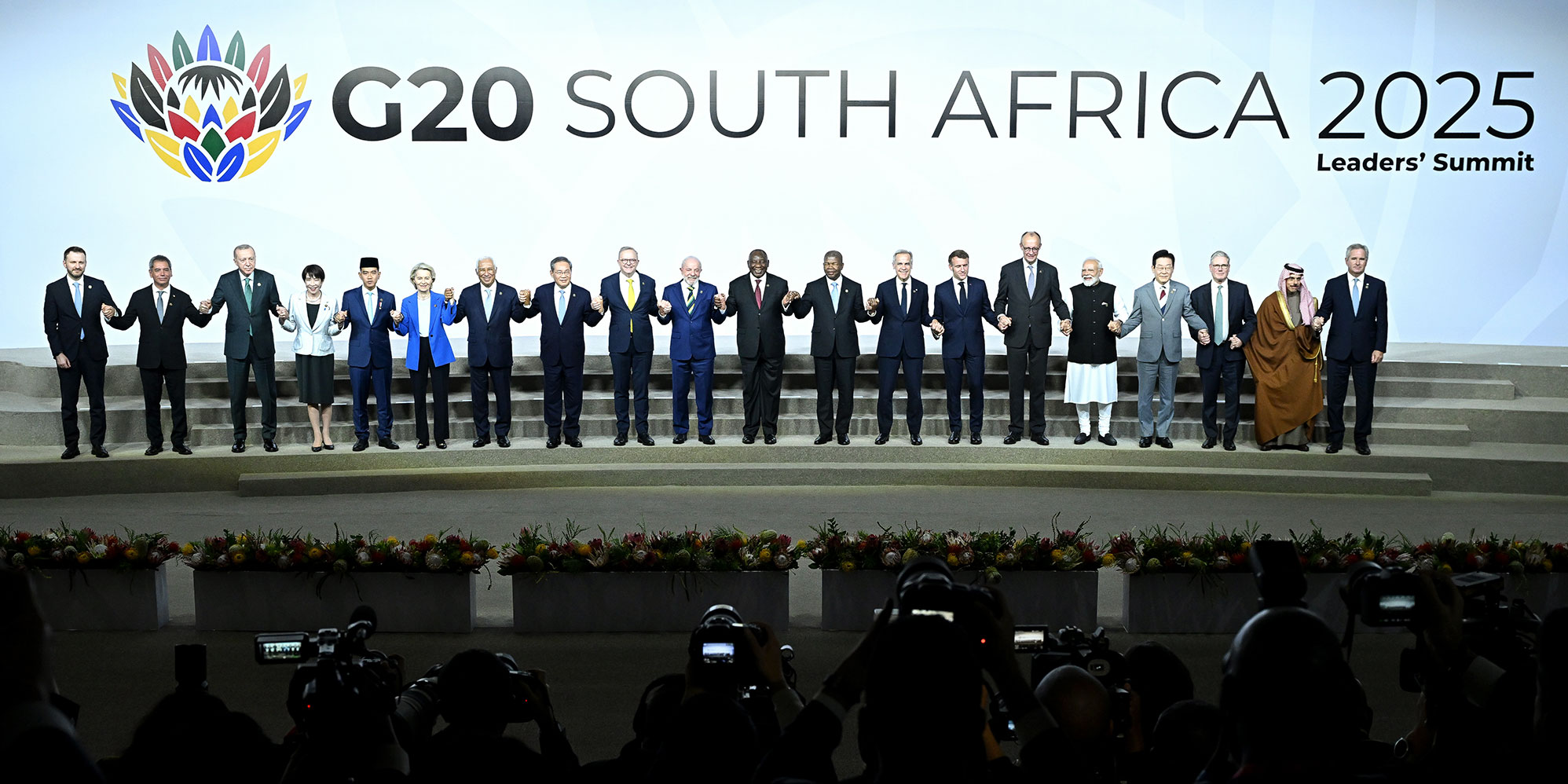Question: You had a great context for the B20: an S&P upgrade, an interest rate cut, a solid Medium-Term Budget Policy Statement, which showed debt is being stabilised, we got off the Financial Action Task Force grey list. Coincidence or planning?
Answer: It was a fortunate alignment of disciplined planning and positive timing. South Africa’s reforms – stabilising debt, strengthening institutions and restoring credibility – created a strong backdrop for the summit. This reinforced our message that South Africa is resilient, on an improving economic trajectory and ready to lead responsibly in global economic conversations.
Q: Standard Bank group CEO and chair of the B20 South Africa finance and infrastructure task force, Sim Tshabalala, said the value of the B20 is in the conversations held. Do you agree and which were the most important conversations?
A: Absolutely. The B20 is not a side-stream to the G20, it is its bloodstream.
The most important conversations were those that built consensus around:
1. Critical minerals and industrialisation: positioning Africa as a value-adding partner;
2. Energy transition: balancing sustainability with affordability and access;
3. Skills development: preparing Africa’s workforce for a digital and green economy;
4. Financial infrastructure and policy regulation: ensuring capital is priced to real risk, strengthening regulatory frameworks and lowering the cost of capital to unlock investment in infrastructure and industry; and
5. Multilateral trust: reaffirming principled cooperation in a multipolar world.
Q: Semafor Africa said the focus of the B20 was on support for multilateralism and on the importance of a global multilateral trading system. Do you agree and do you think it is still possible in a world of unilateralism and brinkmanship?
A: Yes, I agree. Our theme was “Inclusive Growth and Prosperity through Global Cooperation”. Africa itself is proof that multilateralism is possible – the AfCFTA (African Continental Free Trade Area) is among the most ambitious integration projects anywhere. Of course, the world is fractured, but we have shown that consensus can be built even across deep differences. Business thrives where trust, predictability and reciprocity exist, which is why the B20 must continue to champion principled multilateralism.
Q: Did the US pullout impact the functioning of the B20? I believe that the American contingent at the B20 was significant.
A: The American contingent at the B20 Summit was actually very significant – nearly 600 delegates. Their presence underscored the depth of US-Africa business ties. Gary Litman, the incoming US B20 sherpa, congratulated South Africa’s business sector for its “ambition, sophistication and knowledge”, noting that the distinction between Global North and South is no longer decisive. “We are all committed to the same thing: accelerating real economic growth for our countries.” Suzanne Clark, CEO of the US Chamber of Commerce, echoed this when she accepted the handover. That spirit of continuity reassures me that the B20 remains resilient and multipolar.
Q: Were there any deals or investments made you can tell us about? I saw that Visa, for example, opened a data centre. That’s huge.
A: Visa’s data centre is indeed a powerful signal of confidence in Africa’s digital future.
Beyond individual announcements, South Africa leaves 11 Legacy Initiatives that will continue.
These are anchored by six themes – mining and critical minerals, food and climate resilience, education and the future of work, entrepreneurship, finance and capital access, and B20 continuity.
Highlights include:
1. Collaboration on critical minerals in Africa with the World Economic Forum;
2. Transforming mining-dependent economies into sustainable hubs, led by the Minerals Council South Africa;
3. The South African food loss and waste initiative, tackling food security with Nestlé and the Consumer Goods Council;
4. The launch of the Bloomberg NEF Academy South Africa, to equip senior leaders with knowledge, networks and tools to navigate the energy transition and lead low-carbon economic transformation across Africa;
5. Reducing the cost of capital for Africa, reforming credit ratings and unlocking affordable finance; and
6. Bridging business and philanthropy from South Africa to the US and beyond, into the next G20 presidency.
These initiatives are action-oriented, measurable and designed to endure. They are the true legacy of B20 South Africa.
Q: What will a good legacy for the B20 process be in a year’s time?
A: A good legacy will be continuity and implementation. Success will mean:
- Policy reforms that ease trade and investment;
- Concrete projects in energy, infrastructure and digitalisation;
- Broader participation of women and SMEs in competitive markets.
If we can point to measurable progress in these areas, then the B20 will have left a meaningful mark.
Q: What were your favourite moments?
A: The real highlight was not only what happened on stage, it was the calibre of the conversations and the enduring connections built off the plenary floor. That encourages me, because it means the value of the summit is not confined to this week – it is the work that continues. DM





 (L-R) World Leaders including Turkish President Recep Tayyip Erdogan, Japan's Prime Minister Sanae Takaichi, Indonesia's Vice President Gibran Rakabuming Raka, European Commission President Ursula Von der Leyen, European Council President Antonio Costa, China's Prime Minister Li Qiang, Australia's Prime Minister Anthony Albanese, Brazil's President Luiz Inácio Lula da Silva, South African President Cyril Ramaphosa, Angola's President Joao Lourenco, Canadian Prime Minister Mark Carney (C) France's President Emmanuel Macron, German Chancellor Friedrich Merz, India's Prime Minister Narendra Modi, South Korea's President Lee Jae Myung, Britain's Prime Minister Keir Starmer, Saudi Arabia's Foreign Minister Prince Faisal bin Farhan Al Saud and Argentinian Foreign Minister Pablo Quirno pose for a photograph as leaders assembled for the “family photo” at the G20 Summit on November 22, 2025 in Johannesburg, South Africa ahead of the G20 Summit. The heads of state and government gathered here did not include those from the United States, which boycotted the event over its objections to South Africa’s G20 presidency. (Photo by Leon Neal / Getty Images)
(L-R) World Leaders including Turkish President Recep Tayyip Erdogan, Japan's Prime Minister Sanae Takaichi, Indonesia's Vice President Gibran Rakabuming Raka, European Commission President Ursula Von der Leyen, European Council President Antonio Costa, China's Prime Minister Li Qiang, Australia's Prime Minister Anthony Albanese, Brazil's President Luiz Inácio Lula da Silva, South African President Cyril Ramaphosa, Angola's President Joao Lourenco, Canadian Prime Minister Mark Carney (C) France's President Emmanuel Macron, German Chancellor Friedrich Merz, India's Prime Minister Narendra Modi, South Korea's President Lee Jae Myung, Britain's Prime Minister Keir Starmer, Saudi Arabia's Foreign Minister Prince Faisal bin Farhan Al Saud and Argentinian Foreign Minister Pablo Quirno pose for a photograph as leaders assembled for the “family photo” at the G20 Summit on November 22, 2025 in Johannesburg, South Africa ahead of the G20 Summit. The heads of state and government gathered here did not include those from the United States, which boycotted the event over its objections to South Africa’s G20 presidency. (Photo by Leon Neal / Getty Images)